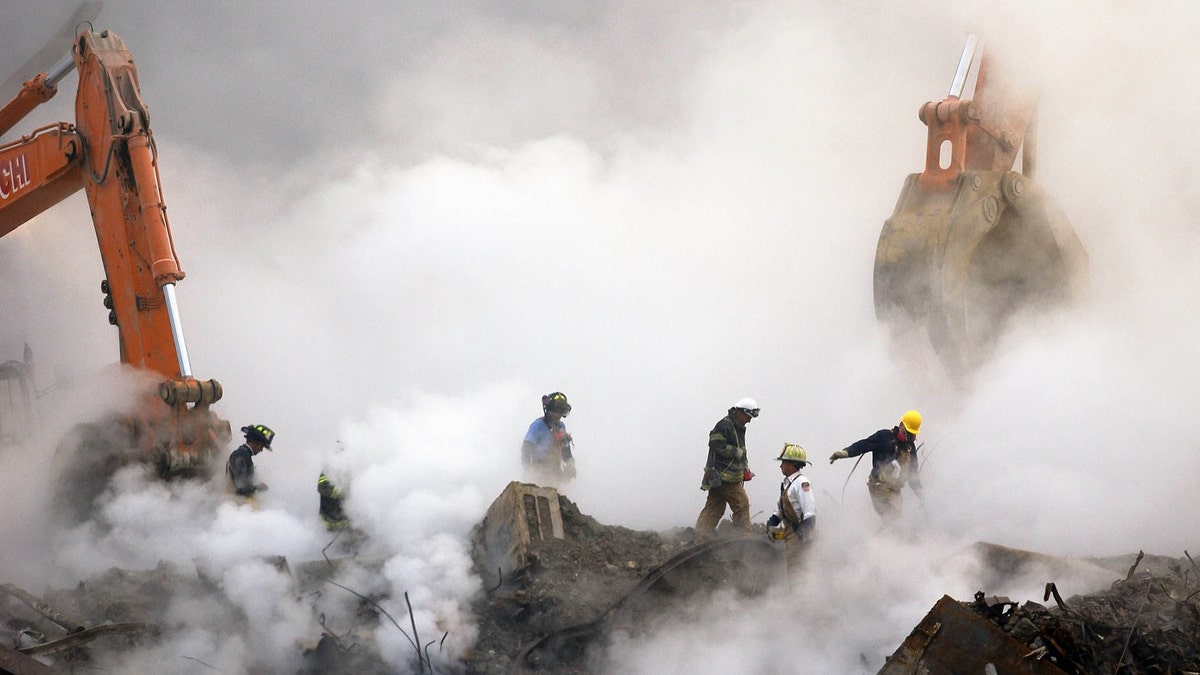
Hundreds of low-paid workers that worked on the perimeter of the disaster site haven't been nearly as visible as those who worked at the site itself, but they are struggling to cope with how their proximity to Ground Zero has transformed their lives. (AP)
Day after day, Colombian immigrant Nayibe Padredin trekked through layers of dust in lower Manhattan after 9-11 to get to her job cleaning cleaning offices near Ground Zero. After three months, she had coughing fits, began getting headaches and found herself easily fatigued.
But she needed the money. And she kept working.
Hundreds of low-paid cleaners toiled alongside her, many of them also Spanish-speaking immigrants. Now Padredin and many of her colleagues say they're sick from the time they spent cleaning without adequate protective gear. They haven't been nearly as visible as those who worked at the site itself, but they are struggling to cope with how their time on the perimeter of the disaster site has transformed their lives.
Ten years after the attacks, their symptoms are the same as those reported by many others exposed to the dust, primarily respiratory and digestive illnesses like asthma and acid reflux. Programs offer medical assistance to anyone who spent time at the site after the attacks and is diagnosed with those conditions, but for reasons ranging from ignorance of the application process to fear of being deported, some of the cleanup workers did not immediately seek treatment or compensation.
"They are hesitant to seek health care because they are afraid," said Dr. Jaime Carcamo, a psychologist who treats about 90 Hispanic cleanup workers in Queens, some of who are undocumented immigrants.
Padredin, 72, came to the U.S. on a tourist visa in 1999 from Colombia and never left. In New York, she sold tamales on the street and sewed in a mattress factory until she found a job at a cleaning company, which led her to ground zero a week after the attacks. For six months, she cleaned the dust for $60 a day. She began to feel sick in mid-winter, with a sudden onset of symptoms she did not previously suffer from, she said. Now she has asthma, headaches and stomach problems. She says she can no longer work and wants to go back to Colombia.
"I feel like crying all the time," she said. "Every day I am more useless."
A bill that President Barack Obama signed into law last year gives aid to residents and people who became ill working in or near the ruins, providing $4.2 billion. No one knows how many from this uncounted workforce will come forward with claims.
About 16,000 responders and 3,000 residents are already getting treatment and another 40,000 responders are being regularly checked by doctors for possible symptoms.
The medical programs and the victims fund do not ask about immigration status, but that doesn't stop some from worrying that by outing themselves to the government, they could be at risk for deportation.
John Feal, a construction supervisor who was injured at ground zero and became an advocate for sick responders, said he recalls seeing the cleaners waiting on the street and then being led into buildings clutching paper masks.
"They did their job just like any other American," he said.
Since February, Padredin and other Spanish-speaking cleanup workers have been meeting in Jackson Heights, a bustling immigrant neighborhood in Queens, to sort through information about health care and compensation. Language barriers had led to a lot of misunderstandings about the programs, so the goal is to clear things up.
Other cleaners have become active politically, like Alex Sánchez, the U.S.-born son of Dominican immigrants. When he arrived at ground zero after the attacks, he felt like he was serving his country. He cleaned ventilation ducts in the tall buildings, which had sucked in the caustic dust and smoke. Now the 44-year-old Harlem resident says he suffers from a variety of debilitating respiratory problems. After falling ill, he joined up with responders pushing for federal help and traveled to Washington to lobby for it.
He is also one of 125 cleaners who filed a lawsuit against building owners and contractors, saying they should have been given protective gear. His lawyer, Gregory Cannata, said some cleaners may withdraw from the suit because anyone who applies to the victims fund cannot participate in related litigation. Sanchez said he wants to continue with the suit.
"None of us wanted to be sick," Sánchez said. "But we still feel proud of what we did."
Based on reporting by The Associated Press.
Follow us on twitter.com/foxnewslatino
Like us at facebook.com/foxnewslatino
